一般过去时语法总结归纳(1)
- 格式:doc
- 大小:50.50 KB
- 文档页数:2
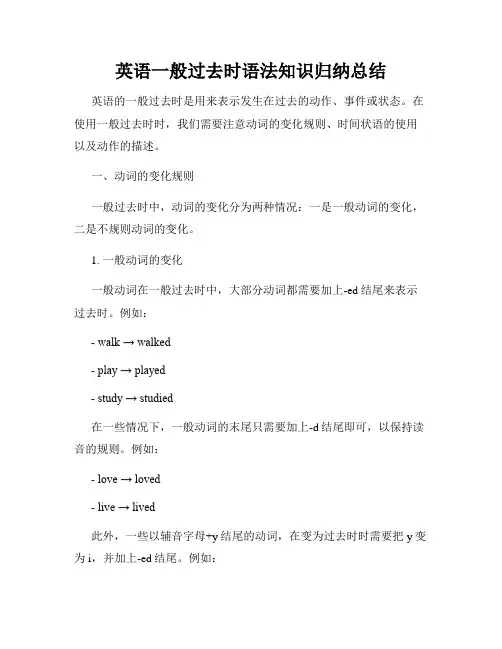
英语一般过去时语法知识归纳总结英语的一般过去时是用来表示发生在过去的动作、事件或状态。
在使用一般过去时时,我们需要注意动词的变化规则、时间状语的使用以及动作的描述。
一、动词的变化规则一般过去时中,动词的变化分为两种情况:一是一般动词的变化,二是不规则动词的变化。
1. 一般动词的变化一般动词在一般过去时中,大部分动词都需要加上-ed结尾来表示过去时。
例如:- walk → walked- play → played- study → studied在一些情况下,一般动词的末尾只需要加上-d结尾即可,以保持读音的规则。
例如:- love → loved- live → lived此外,一些以辅音字母+y结尾的动词,在变为过去时时需要把y变为i,并加上-ed结尾。
例如:- try → tried- carry → carried2. 不规则动词的变化不规则动词在一般过去时中的变化不遵循规则,需要记忆其特定的形式。
例如:- go → went- eat → ate- see → saw二、时间状语的使用时间状语可以用来表示动作发生的具体时间,在一般过去时中,使用不同的时间状语可以帮助我们更准确地描述过去的动作或事件。
例如:- yesterday(昨天)- last week(上周)- in 2005(在2005年)- when I was a child(当我还是个孩子时)三、动作的描述在使用一般过去时时,我们需要注意动作的描述,尽量使用简洁明了的语句来表达过去发生的事情。
同时,可以使用连词和逻辑词语来连接不同的句子,使文章更加连贯。
例如:- I went to the park yesterday. It was a sunny day.- We played football last week, but we lost the game.总结:英语一般过去时是用来表示过去发生的动作、事件或状态。
动词的变化规则分为一般动词和不规则动词两种情况,需要根据动词的不同形式来变化。
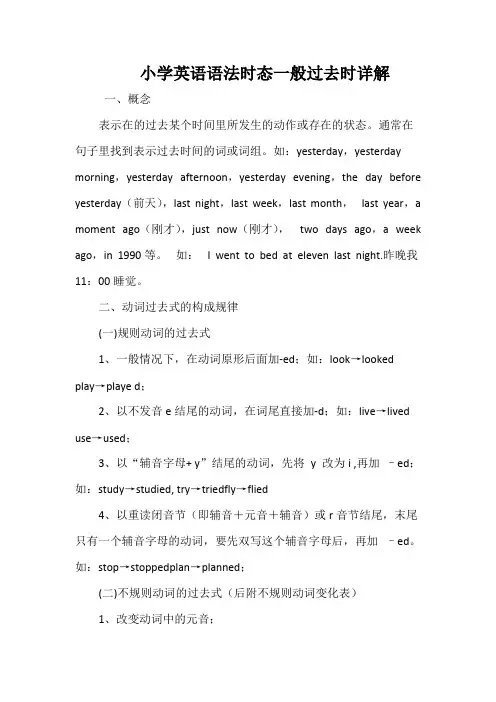
小学英语语法时态一般过去时详解一、概念表示在的过去某个时间里所发生的动作或存在的状态。
通常在句子里找到表示过去时间的词或词组。
如:yesterday,yesterday morning,yesterday afternoon,yesterday evening,the day before yesterday(前天),last night,last week,last month,last year,a moment ago(刚才),just now(刚才),two days ago,a week ago,in 1990等。
如:I went to bed at eleven last night.昨晚我11:00睡觉。
二、动词过去式的构成规律(一)规则动词的过去式1、一般情况下,在动词原形后面加-ed;如:look→looked play→playe d;2、以不发音e结尾的动词,在词尾直接加-d;如:live→lived use→used;3、以“辅音字母+ y”结尾的动词,先将y 改为i ,再加–ed;如:study→studied, try→triedfly→flied4、以重读闭音节(即辅音+元音+辅音)或r音节结尾,末尾只有一个辅音字母的动词,要先双写这个辅音字母后,再加–ed。
如:stop→stoppedplan→planned;(二)不规则动词的过去式(后附不规则动词变化表)1、改变动词中的元音;begin→began drink→drank come→came eat→ate grow→grew run→ran know→knew win→wonspeak→spoketake→took write→wrote get→got2、变词尾的–d 为–t ;build→built lend→lent send→sent spend→spent bend→bent3、与动词原形一样;cut→cut put→put cost→cost hurt→hurt shut→shut4、变-ay 为-aid (少数动词);say→said pay→paid lay→laid5、采用不同词根;sell→sold teach→taught buy→bought6、其他。
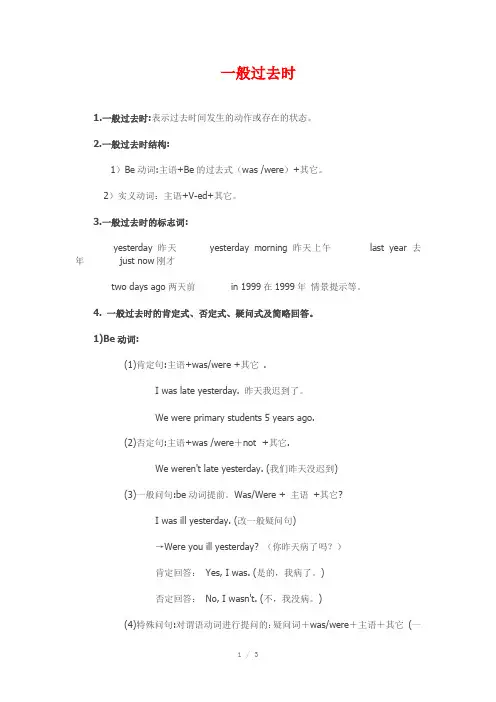
一般过去时1.一般过去时:表示过去时间发生的动作或存在的状态。
2.一般过去时结构:1)Be动词:主语+Be的过去式(was /were)+其它。
2)实义动词:主语+V-ed+其它。
3.一般过去时的标志词:yesterday昨天 yesterday morning 昨天上午 last year去年just now刚才two days ago两天前in 1999在1999年情景提示等。
4. 一般过去时的肯定式、否定式、疑问式及简略回答。
1)Be动词:(1)肯定句:主语+was/were +其它 .I was late yesterday. 昨天我迟到了。
We were primary students 5 years ago.(2)否定句:主语+was /were+not +其它.We weren't late yesterday. (我们昨天没迟到)(3)一般问句:be动词提前。
Was/Were + 主语+其它?I was ill yesterday. (改一般疑问句)→Were you ill yesterday? (你昨天病了吗?)肯定回答:Yes, I was. (是的,我病了。
)否定回答:No, I wasn't. (不,我没病。
)(4)特殊问句:对谓语动词进行提问的:疑问词+was/were+主语+其它(一般疑问句)?I was born in 1997.→When were you born? 你是什么时候出生的?2)实义动词:(1)肯定句:主语+V-ed +其它。
I called up my good friend just now.(2)否定句: 主语+didn’t +V原形+其它I didn’t argue w ith Tom last week.(3)一般问疑句:Did +主语+ V原形+其它?I bought a souvenir in 2010. (改一般疑问句)→Did you buy a souvenir in 2010?肯定回答:Yes, I did.否定回答:No, I didn’t.(4)特殊疑问句: 疑问词+did +主语+ V原形+其它?I went to HongKong last year.→Where did you go to HongKong last year?5. 变化规则(1)、规则动词的变化规则:(1)一般情况下在词尾直接加ed。
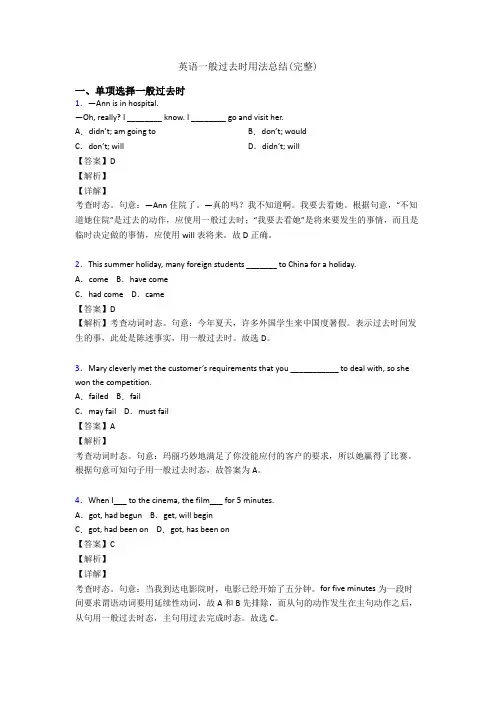
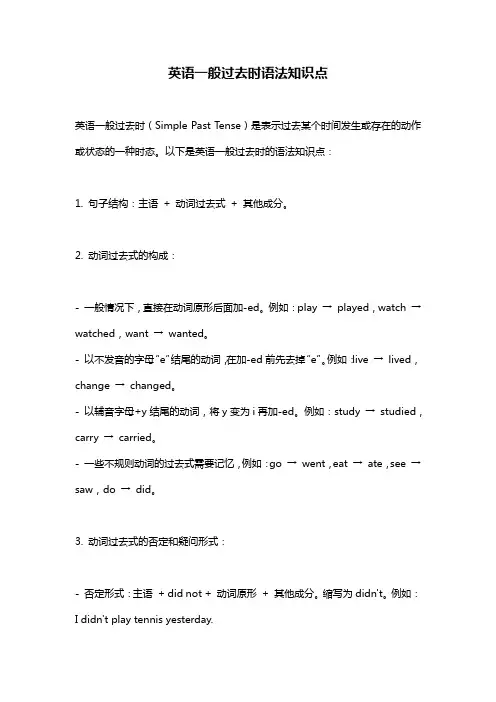
英语一般过去时语法知识点英语一般过去时(Simple Past Tense)是表示过去某个时间发生或存在的动作或状态的一种时态。
以下是英语一般过去时的语法知识点:1. 句子结构:主语+ 动词过去式+ 其他成分。
2. 动词过去式的构成:- 一般情况下,直接在动词原形后面加-ed。
例如:play →played,watch →watched,want →wanted。
- 以不发音的字母“e”结尾的动词,在加-ed前先去掉“e”。
例如:live →lived,change →changed。
- 以辅音字母+y结尾的动词,将y变为i再加-ed。
例如:study →studied,carry →carried。
- 一些不规则动词的过去式需要记忆,例如:go →went,eat →ate,see →saw,do →did。
3. 动词过去式的否定和疑问形式:- 否定形式:主语+ did not + 动词原形+ 其他成分。
缩写为didn't。
例如:I didn't play tennis yesterday.- 疑问形式:Did + 主语+ 动词原形+ 其他成分例如:Did you watch the movie last night?4. 一般过去时的时间状语:昨天(yesterday)、上个月(last month)、去年(last year)等表示过去某个具体时间的时间状语。
5. 一般过去时的用法:- 表示过去某个具体时间发生的动作或状态。
例如:I went to the beach yesterday.- 表示过去一段时间内发生的动作或状态。
例如:I lived in London for two years.- 表示过去习惯性的动作或状态。
例如:When I was a child, I always played with my friends.以上就是英语一般过去时的语法知识点。
记得多加练习,熟练掌握一般过去时的用法。
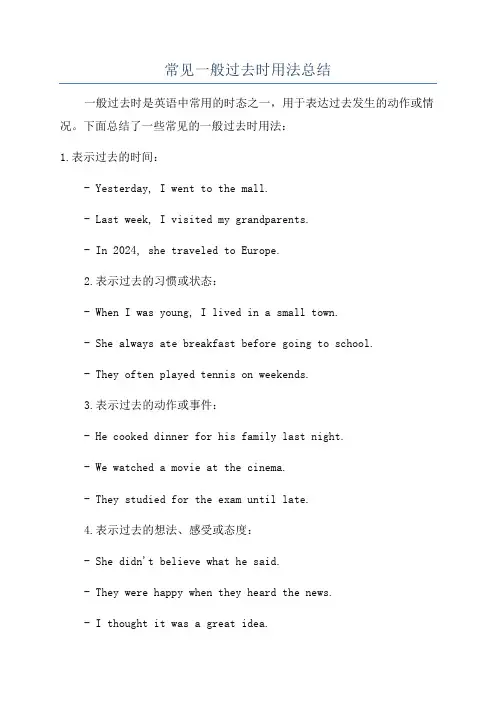
常见一般过去时用法总结一般过去时是英语中常用的时态之一,用于表达过去发生的动作或情况。
下面总结了一些常见的一般过去时用法:1.表示过去的时间:- Yesterday, I went to the mall.- Last week, I visited my grandparents.- In 2024, she traveled to Europe.2.表示过去的习惯或状态:- When I was young, I lived in a small town.- She always ate breakfast before going to school.- They often played tennis on weekends.3.表示过去的动作或事件:- He cooked dinner for his family last night.- We watched a movie at the cinema.- They studied for the exam until late.4.表示过去的想法、感受或态度:- She didn't believe what he said.- They were happy when they heard the news.- I thought it was a great idea.5.表示过去的条件或假设:- If I had known, I would have helped him.- I wish I had studied harder.- She would have won the race if she had trained more.6.表示过去经常性的动作或习惯:- Every day, she walked her dog in the park.- They always went to the beach during summer vacations.- He often played chess with his friends.7.表示过去的计划或安排:- We were supposed to meet at 5 o'clock, but he didn't show up.- They had booked tickets for the concert, but it was canceled.8.表示过去的建议或请求:- He suggested going to the new restaurant for dinner.- I asked him to help me with my homework.- She told me to be careful.9.表示过去的能力或可能性:- She could run very fast when she was younger.- He was able to speak three languages.- They might have gone to the party, but I'm not sure.10.表示过去的频率或数量:- He visited his grandparents twice a month.总结:一般过去时常用于描述过去发生的动作、状态、习惯和想法等。
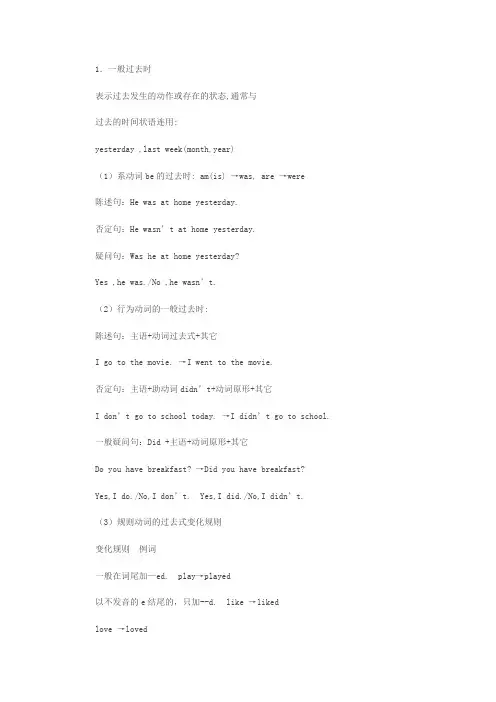
1.一般过去时表示过去发生的动作或存在的状态,通常与过去的时间状语连用:yesterday ,last week(month,year)(1)系动词be的过去时: am(is) →was, are →were陈述句:He was at home yesterday.否定句:He wasn’t at home yesterday.疑问句:Was he at home yesterday?Yes ,he was./No ,he wasn’t.(2)行为动词的一般过去时:陈述句:主语+动词过去式+其它I go to the movie. →I went to the movie.否定句:主语+助动词didn’t+动词原形+其它I don’t go to school today. →I didn’t go to school. 一般疑问句:Did +主语+动词原形+其它Do you have breakfast? →Did you have breakfast? Yes,I do./No,I don’t. Yes,I did./No,I didn’t.(3)规则动词的过去式变化规则变化规则例词一般在词尾加—ed. play→played以不发音的e结尾的,只加--d. like →likedlove →loved以辅音字母+y 结尾的,变y为i ,再加—ed. study →studiedcarry →carried以一个辅音字母结尾的重读闭音节,先双写这个辅音字母,再加-ed stop →stopped plan →planned动词不规则变化:do →did have →had go →wentsee →saw read →read get →gotgive →gave sleep →slept eat →atewrite →wrote find_---found2. what’s the date today? It’s …3. What was the date yesterday? It was…4. What’s the weather like today? It’s …?5. How was your weekend?6.What did she do ? She did her homework7.What did he do last weekend ? He played soccer.8.It’s time to go home= It’s time for home。
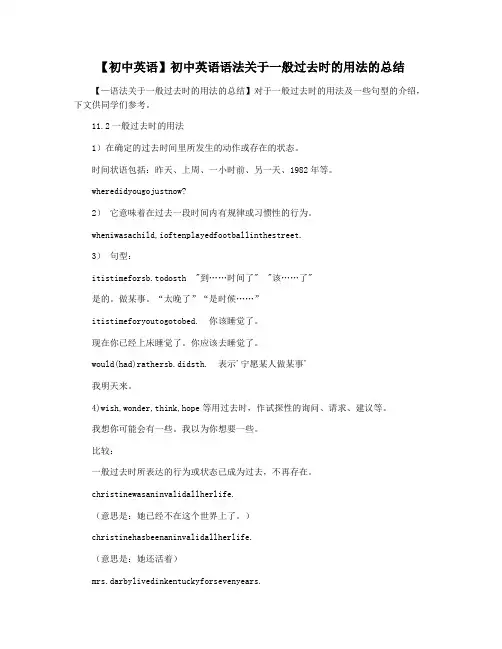
【初中英语】初中英语语法关于一般过去时的用法的总结【—语法关于一般过去时的用法的总结】对于一般过去时的用法及一些句型的介绍,下文供同学们参考。
11.2一般过去时的用法1)在确定的过去时间里所发生的动作或存在的状态。
时间状语包括:昨天、上周、一小时前、另一天、1982年等。
wheredidyougojustnow?2)它意味着在过去一段时间内有规律或习惯性的行为。
wheniwasachild,ioftenplayedfootballinthestreet.3)句型:itistimeforsb.todosth "到……时间了" "该……了"是的。
做某事。
“太晚了”“是时候……”itistimeforyoutogotobed. 你该睡觉了。
现在你已经上床睡觉了。
你应该去睡觉了。
would(had)rathersb.didsth. 表示'宁愿某人做某事'我明天来。
4)wish,wonder,think,hope等用过去时,作试探性的询问、请求、建议等。
我想你可能会有一些。
我以为你想要一些。
比较:一般过去时所表达的行为或状态已成为过去,不再存在。
christinewasaninvalidallherlife.(意思是:她已经不在这个世界上了。
)christinehasbeenaninvalidallherlife.(意思是:她还活着)mrs.darbylivedinkentuckyforsevenyears.达比夫人不再住在肯塔基州mrs.darbyhaslivedinkentuckyforsevenyears.(意思是:仍然住在肯塔基州,可能意味着刚刚离开)注意:用过去时表示现在,表示委婉语气。
1)动词want、hope、wonder、think、intential等。
didyouwantanythingelse?我相信你能帮我。
2)情态动词could,would.你能把自行车借给我吗?对般过去时的用法同学们是否已经了解了呢?如果有不懂的可以参考!。
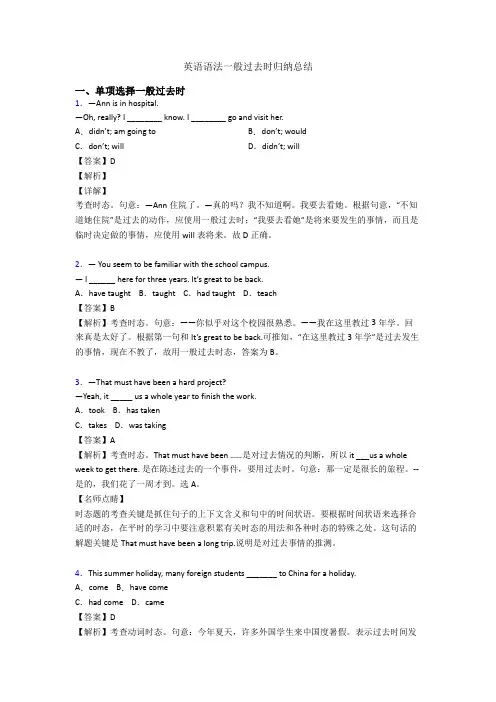
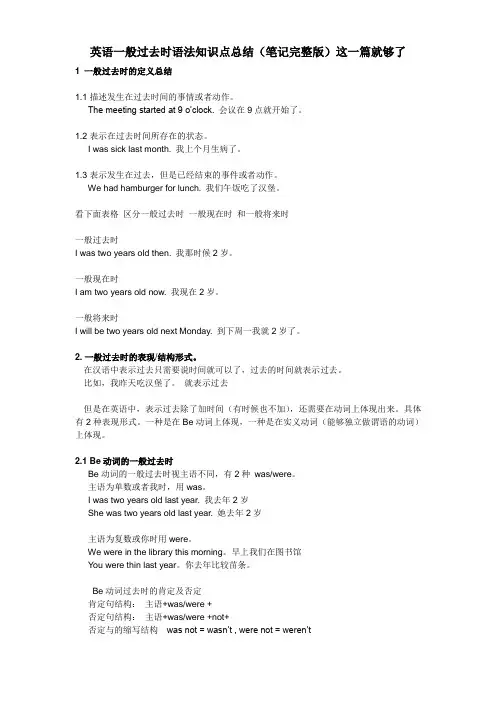
英语一般过去时语法知识点总结(笔记完整版)这一篇就够了1 一般过去时的定义总结1.1 描述发生在过去时间的事情或者动作。
The meeting started at 9 o’clock. 会议在9点就开始了。
1.2 表示在过去时间所存在的状态。
I was sick last month. 我上个月生病了。
1.3 表示发生在过去,但是已经结束的事件或者动作。
We had hamburger for lunch. 我们午饭吃了汉堡。
看下面表格区分一般过去时一般现在时和一般将来时一般过去时I was two years old then. 我那时候2岁。
一般现在时I am two years old now. 我现在2岁。
一般将来时I will be two years old next Monday. 到下周一我就2岁了。
2. 一般过去时的表现/结构形式。
在汉语中表示过去只需要说时间就可以了,过去的时间就表示过去。
比如,我昨天吃汉堡了。
就表示过去但是在英语中,表示过去除了加时间(有时候也不加),还需要在动词上体现出来。
具体有2种表现形式。
一种是在Be动词上体现,一种是在实义动词(能够独立做谓语的动词)上体现。
2.1 Be动词的一般过去时Be动词的一般过去时视主语不同,有2种was/were。
主语为单数或者我时,用was。
I was two years old last year. 我去年2岁She was two years old last year. 她去年2岁主语为复数或你时用were。
We were in the library this morning。
早上我们在图书馆You were thin last year。
你去年比较苗条。
Be动词过去时的肯定及否定肯定句结构:主语+was/were +否定句结构:主语+was/were +not+否定与的缩写结构was not = wasn’t , were not = weren’t例句:翠花去年是个胖子Cuihua was fat last year.翠花去年不胖Cuihua was not(wasn’t) fat last year.Be 动词过去时的一般疑问句,与常规一般疑问句一样,把Be动词提前即可。
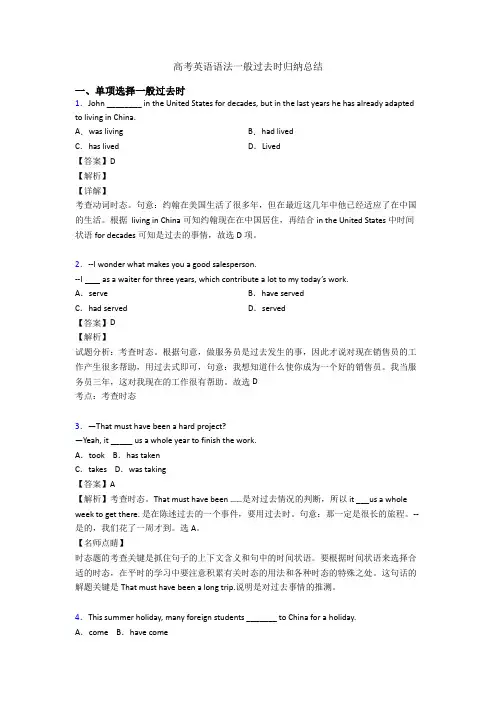
语法归纳一般过去时态1.概念:表示过去发生的动作,常与过去的时间状语连用。
例如:yesterday, the day before yesterday, last week, last month, in 2008等。
2.谓语构成:(1)动词的过去式(2)was/were3.句式(1)肯定句主+动词的过去式……I visited my uncle yesterday.主+was/were…The food was delicious. They were tired last week, (2) 否定句主+didn’t…I didn’t visit my uncle yesterday.主+wasn’t/weren’t…The food wasn’t delicious.(3) 一般疑问句Did+主…? Did you go to the library yesterday.Was/Were+主…?Were they friendly to you?肯定或否定回答:Yes, 主+did./ No, 主+didn’t.Yes, 主+was/were./ No, 主+wasn’t/weren’t例如:He went to the zoo yesterday. 昨天他去了动物园。
否定句:He didn’t go to the zoo yesterday.一般疑问句:Did he go to the zoo yesterday?肯定回答:Yes, he did.否定回答:No, he didn’t.Mary was born in Beijing. 玛丽在北京出生。
否定句:Mary wasn’t born in Beijing.一般疑问句:Was Mary born in Beijing?肯定回答:Yes, she was.否定回答:No, she wasn’t.(4)特殊疑问句由“疑问词+一般疑问句”构成,例如:1. Where did you go?2. How was the weather?3. What food did you eat?4. How did you feel about the trip?。
高中英语时态语法总结归纳英语时态是表示动作发生时间的一种语法形式,在高中英语学习中扮演着重要的角色。
正确使用时态可以使语言表达更加准确和流畅。
本文将对高中英语常用的时态进行总结归纳,以帮助学生更好地掌握时态的用法。
一、一般现在时 (Simple Present Tense)一般现在时用于表示经常性的动作、客观事实、真理、习惯和固定时间表等。
1. 结构:主语 + 动词原形(单数加s或es)+ 其他2. 示例:- He plays soccer every weekend.(他每个周末都踢足球。
)- Water boils at 100 degrees Celsius.(水在100摄氏度时沸腾。
)- I usually go to bed at 10 o'clock.(我通常十点钟上床睡觉。
)二、一般过去时 (Simple Past Tense)一般过去时用于表示过去某个时间发生的动作或状态。
1. 结构:主语 + 动词过去式(一般过去时动词过去式的变化规则多样)2. 示例:- They went to the park yesterday.(他们昨天去了公园。
)- She watched a movie last night.(她昨晚看电影了。
)- I played the guitar when I was young.(我年轻时弹吉他。
)三、一般将来时 (Simple Future Tense)一般将来时用于表示将来某个时间或情况下发生的动作或状态。
1. 结构:主语 + will/shall + 动词原形2. 示例:- We will study English tomorrow.(我们明天将学习英语。
)- He shall help you with your assignment.(他将帮助你完成作业。
)- They won't go to the party this weekend.(他们这个周末不会去参加派对。
初中英语语法讲解:一般过去时的用法编者按:一般过去时表示过去某个时间所发生的动作或存在的状态,也可表示过去经常或反复发生的动作。
下面是关于初中英语学习中一般过去时的基本用法,欢迎阅读参考!一般过去时的用法一. 概念:一般过去时用来表示过去某一时间内发生的动作或存在的状态以及过去习惯性、反复性的动作。
二. 谓语动词要用动词的过去式1.一般情况下,在动词原形后面加-ed。
look→looked play→played start→started visit→visited2.以不发音e结尾的动词,在词尾直接加-d。
live→lived use→used3.以“辅音字母+ y”结尾的动词,变y 为i ,加study→studied try→tried fly→flied4.以重读闭音节(即辅音+元音+辅音)或r音节结尾,末尾只有一个辅音字母的动词,要先双写这个辅音字母后,再加–ed。
stop→stopped plan→planned prefer→preferred5. 不规则变化(见附表)三. 常用的时间状语yesterday , the day before yesterday , last… , this morning /… , just now , a moment ago , in + 过去的时间 ,two days ago, when 引导的过去时的句子。
四. 一般过去时的结构:1.含有be动词的一般过去时, am is 的过去式为was; are的过去式为were(1)肯定句式:Mary was busy last week.(2)否定句式:Mary wasn’t busy last week. (变否定句在was/were后直接加not)(3)一般疑问句:Was Mary busy last week? (一般疑问句将was/were动词提至句首)Yes, she was. No, she wasn’t(4)特殊疑问句: How was Mary last week?注:在这种构成中,be动词有人称和数的变化,即要根据主语选用was / were。
一般过去时I. 一般过去时的概念一般过去时表示过去某个时间发生的动作或存在的状态。
常和表示过去的时间状语连用。
如:last year, yesterday, last week, three years ago, in 1978, a moment ago, just now等;也可表示过去经常反复发生的动作,常和often, always等频率副词连用。
例如:①I saw him in the street yesterday. 昨天我在街上看见他了。
②Li Mei always went to school on foot last year. 去年李梅总是步行上学II. 一般过去时的几种句型be动词过去式的句式。
否定句是在was/were后面加not,was not (wasn't)/were not (weren't)。
一般疑问句是把was / were提前并放到句首,要求首字母要大写。
实义动词过去式的句式。
肯定句结构为:主语+动词的过去式+其它。
如:He went to the toy store yesterday. 他昨天去玩具店了。
否定句结构为:主语+did not (didn’t)+动词原形+其它。
如:He didn’t go to the toy store yesterday. 他昨天没去玩具店。
一般过去时的一般疑问句的构成:Did+主语+动词原形+其它?如:1) -Did you go to Beijing last week?-Yes, we did. (No, we didn’t.)2) -Did you meet the businessman before?-No, I didn’t. (Yes, I did.)一般过去时的特殊疑问句的构成:疑问词+did+主语+动词原形+其它?如:1) -What did you do last night?-I did my homework.2) -Where did you go last week?-I went to Shanghai with my parents.。
一般过去时和过去进行时的语法总结过去时态是英语中用来表示已经发生或已经完成的动作、事件或状态的一种时态。
在过去时态中,一般过去时和过去进行时是两种常用的时态形式。
下面将对一般过去时和过去进行时进行语法总结和概述。
一、一般过去时(Simple Past Tense)的用法一般过去时表示过去发生的一次性或完成的动作、事件、状态,或者过去的习惯性、持续性动作。
1. 表示过去某个时间发生的动作或事件。
例如:- I went to the park yesterday.(我昨天去了公园。
)- He studied English last night.(他昨晚学习了英语。
)2. 表示过去的习惯性动作或状态。
例如:- She played tennis every week.(她每周打网球。
)- We lived in that house for five years.(我们在那所房子里住了五年。
)3. 表示过去的状态或特征。
例如:- It was sunny yesterday.(昨天天晴。
)- He was a doctor when he was young.(他年轻时是个医生。
)4. 与时间状语连用。
一般过去时常与表示过去的时间状语连用,如:yesterday(昨天)、last week(上周)、in 1999(在1999年)、when I was a child(当我还是个孩子时)等。
二、过去进行时(Past Continuous Tense)的用法过去进行时表示过去某个时间正在进行的动作或状态。
1. 表示过去某个时间点正在进行的动作。
例如:- They were playing basketball at 5 p.m. yesterday.(昨天下午5点他们正在打篮球。
)- I was cooking dinner when she called me.(她给我打电话时,我正在做晚饭。
)2. 表示过去的一段时间内正在进行的动作。